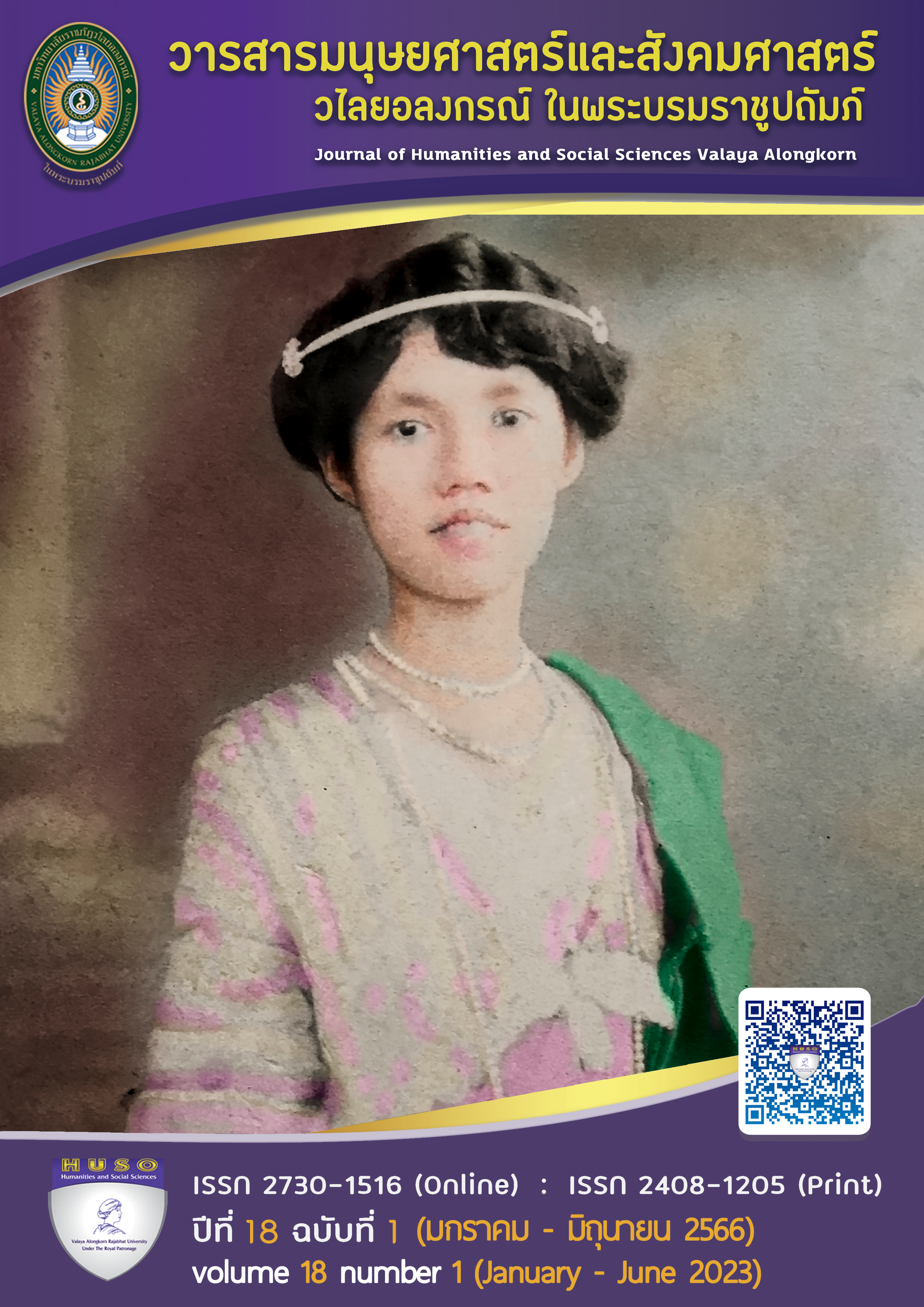DEVELOPMENT OF INQUIRY-BASED INSTRUCTIONAL PROCESS TO PROMOTE INDEPENDENT LEARNING ABILITY FOR IDEOLOGICAL AND MORAL CULTIVATION AND LEGAL BASIS
Main Article Content
Abstract
The objectives were to 1) develop the inquiry-based instructional process to promote independent learning ability for Ideological and Moral Cultivation and Legal Basis, and
2) implement and determine the effectiveness of the inquiry-based instructional process to promote independent learning ability. The population of this study was 400 first-year undergraduates in the first semester of 2022-2023 academic year in Zhoukou Normal University. The sample was 30 students derived from a cluster sampling. The research instruments were 1) six lesson plans using inquiry-based instructional process, 2) the independent learning ability evaluation forms including classroom observation form and self-evaluation form with the criterion set at 70 percent, and 3) the questionnaire for students’ satisfaction. The research instruments could be used after evaluation by five experts. The statistics used for data analysis were the mean, standard deviation, and t-test of one sample.
The findings of the study were as follows. The inquiry-based instructional process to promote independent learning ability for Ideological and Moral Cultivation and Legal Basis was consisted of seven steps. Before class, it was Step 1 which was "Assignment and preview". During class, it was Step 2 which was "Introduce situations", Step 3 which was "Individual inquiry", Step 4 which was "Cooperative group inquiry", Step 5 which was "Presentation of the result", and Step 6 which was "Summary and evaluation". After class, it was Step 7 which was "Assignment and homework. The mean score, which was evaluated by five experts, was 4.22 - 4.88. This was higher than the criterion of 3.51, and the standard deviation was 0.14 - 0.30.
After using the inquiry-based instructional process, the percentage of the independent learning ability, the classroom observation, the self-evaluation of the students and the students’ satisfaction were higher than the criterion set at 70 percentage with statistical significance at .05 level.
Article Details

This work is licensed under a Creative Commons Attribution-NonCommercial-NoDerivatives 4.0 International License.
ลิขสิทธิ์บทความวิจัยที่ได้รับการตีพิมพ์เผยแพร่ในวารสารมนุษยศาสตร์และสังคมศาสตร์ วไลยอลงกรณ์ ในพระบรมราชูปถัมภ์ ถือเป็นกรรมสิทธิ์ของคณะมนุษยศาสตร์และสังคมศาสตร์ มหาวิทยาลัยราชภัฏวไลยอลงกรณ์ ในพระบรมราชูปถัมภ์ ห้ามนำข้อความทั้งหมดหรือบางส่วนไปพิมพ์ซ้ำ เว้นแต่จะได้รับอนุญาตจากมหาวิทยาลัยเป็นลายลักษณ์อักษร
ความรับผิดชอบ เนื้อหาต้นฉบับที่ปรากฏในวารสารมนุษยศาสตร์และสังคมศาสตร์ วไลยอลงกรณ์ ในพระบรมราชูปถัมภ์ เป็นความรับผิดชอบของผู้นิพนธ์บทความหรือผู้เขียนเอง ทั้งนี้ไม่รวมความผิดพลาดอันเกิดจากเทคนิคการพิมพ์
References
Hao, W. (2020). Ideological and Moral Cultivation and Legal Basis. The application of discussion teaching. Journal of Teaching and Research, 6(5), 81-85.
Liu, H. (2011). Research on "self-inquiry" teaching under the guidance of Constructivism theory, Journal of Beijing Normal University (Social Sciences), 13(12), 23-27.
Liu, X. (2021). Research on Strategies of smart classroom to improve college students' independent learning ability. Comparative study on cultural innovation, 5(8), 95-97.
Peng, X. (2011). A Preliminary study on the "three Sections and nine steps" classroom teaching model of efficient student textbooks. Academic Weekly, 9(4), 63-66.
Peng, X. (2013). On the concept of research teaching in universities. Education Guide, 6(3), 39-44.
Xia, X. (2012). Research and Practice of inquiry-based learning Styles (Vol. 2). Shandong University Press.
Ye, L. (2016). A New Exploration on the Role and Development of Teachers. Beijing: Education Science Press.
Zhong, G. (2014). Construction of inquiry-based Teaching Model in Ideological and Political Theory Course. Heilongjiang Higher Education Research, 5(2),26-31.


